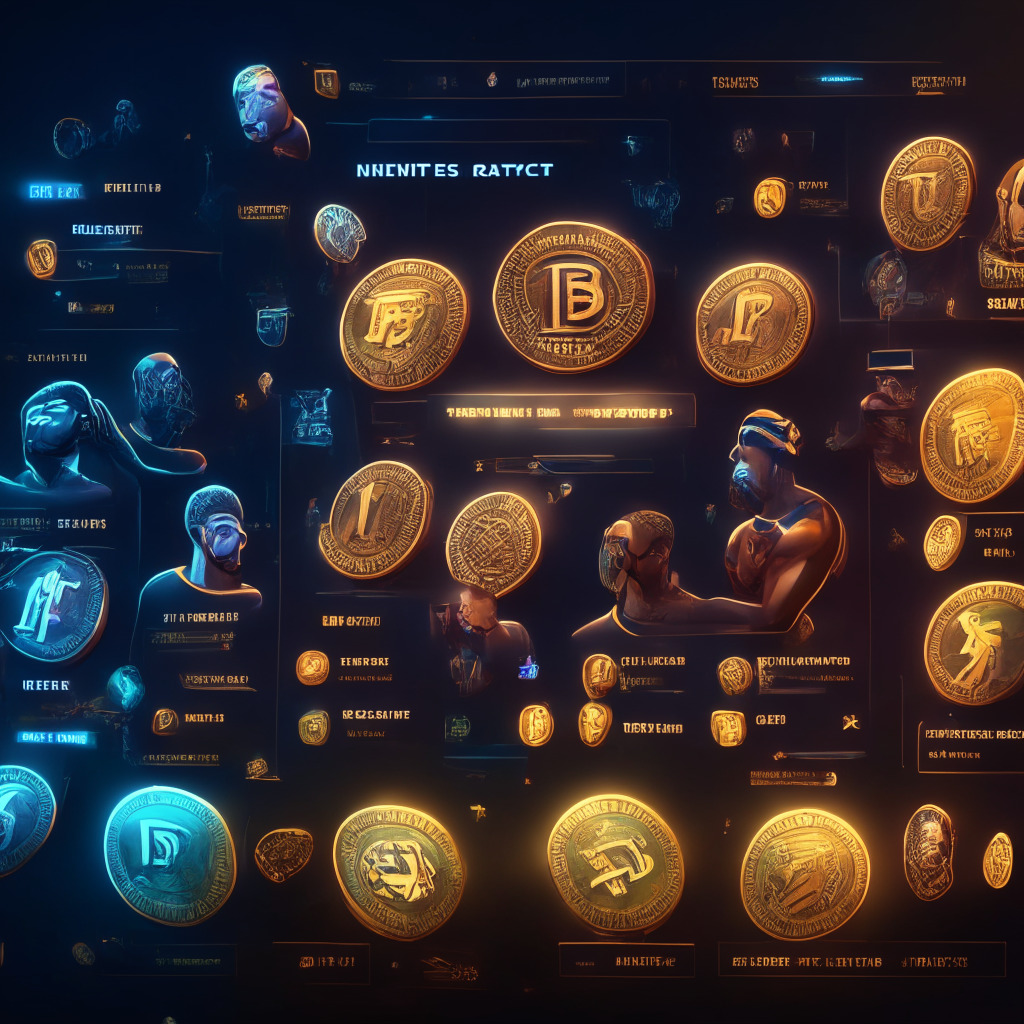The SEC has filed a lawsuit against internet marketer Richard Heart for orchestrating unregistered securities offerings, deceiving investors, and misusing funds. Heart’s projects, Hex, PulseChain, and PulseX, promised immense wealth but have been met with instability and legal troubles. This highlights the necessity for transparency and regulatory compliance in the crypto landscape.
Search Results for: U.S
Binance Gains Operational MVP License in Dubai: A Leap or a Barrier for Crypto Investors?
“Binance, the world’s largest crypto exchange, acquired an Operational MVP License to function in Dubai, allowing them to hold client funds, operate a crypto exchange and provide payment and custody solutions. However, this service currently only extends to institutional and qualified retail investors in the area. Despite this, Dubai’s aim to become a global center for blockchain and crypto activities has received industry approval. Navigating Dubai’s licensing procedure and achieving full regulatory compliance remains a challenge for Binance.”
Tether’s Rising Treasury Reserves: A Balancing Act between Expansion and Security
“Tether recently disclosed a Q2 attestation, revealing a $3.3 billion jump in its excess reserves. Despite raising market concerns due to increasing U.S. Treasury bill holdings, Tether maintains 100% reserves for USDT tokens and continues growing financially. Transparency around reinvested profits becomes key to investor confidence.”
Sorare’s Strategic Shift: Linking Mainstream Currencies with NFTs for User Accessibility
Web3 fantasy-sports platform, Sorare, has introduced support for mainstream currencies to make its blockchain-based digital trading cards more accessible. Despite easing the use of the platform, cards remain as NFTs, and all transactions continue on the blockchain. This move balances improving access with promoting digital assets in mainstream tech.
Coinbase vs. SEC: The Battle for Crypto Diversity Dependent on Bitcoin Only Policy
“Coinbase CEO, Brian Armstrong, recently claimed that the SEC instructed the crypto exchange platform to delist all cryptocurrencies except for Bitcoin. He believes this perspective, which sees all cryptos bar Bitcoin as securities, does not align with their understanding of legislation and could spell the end for the U.S. crypto industry.”
Bitcoin’s Struggle Amid Macroeconomic Factors: Is a Bullish Rebound Projected or Not?
“Bitcoin’s (BTC) stability remains unperturbed by the recent exploit with Curve Finance, as investors are urged to practice vigilant risk management. Although a significant price boost isn’t anticipated until 2024’s halving, BitBull Capital CEO, Joe DiPasquale, anticipates a prolonged positive market shift.”
Saving Billions with Blockchain: A Look into the Predicted Surge of Crypto Payments by 2030
According to a report by Ripple and the US Faster Payments Council, global financial institutions could save $10 billion by 2030 through the use of blockchain technology for cross-border payments. There’re diverging opinions on the timeline for widespread merchant acceptance of crypto payments, with estimates ranging from one to three years for significant adoption to occur. This adoption is contingent on the evolution of blockchain and crypto regulations.
Overturned SEC Ruling on SPIKES Index: What it Means for Crypto Regulation
“The U.S. SEC’s ruling exempting SPIKES Index from security futures has been overturned by the D.C. Circuit. The decision transitions SPIKES Index futures back to securities futures, affecting market participants and possibly influencing upcoming disputes between cryptocurrency firms and the SEC.”
Banking Crisis Ripple: Heartland Tri-State Bank’s Collapse & Its Implications on Industry Safety
“The disruption in the U.S. banking sector, illustrated by the recent collapse of Heartland Tri-State Bank, is attributed to rising U.S. interest rates and inadequate risk management. This crisis highlights a need for improved banking system safety measures and increased bank executive accountability.”
Navigating the Turbulence: The Dizzying Heights and Depths of Worldcoin’s WLD Token
Worldcoin (WLD) has seen a 70% plunge from its debut price, now stabilizing at around $2.35. This crypto project founded by Sam Altman uses an airdrop linked to eyeball scanning for token distribution. The price of WLD is anchored around $2 until October 2023 due to its initial supply agreement, suggesting an interesting strategy to draw potential users.
Understanding Bitcoin’s Current Market Stance: A Double-Edged Sword
“Bitcoin is currently around $29,300, an 8% decline from annual highs. A potential further decrease could lead to significant long-term support around $28,500. Fundamental factors suggest a possible bounce-back, with institutional adoption being optimistic. Bitcoin’s future seems promising, especially with the 2024 halving.”
Blockchain Innovators on Trial: The Balance Between Public Defense and Witness Intimidation
U.S. prosecutors are advocating for imprisoning FTX founder Sam Bankman-Fried, accusing him of attempting to tamper with witness testimonies. These allegations emphasize the need for stringent regulations ensuring fair play and transparency in the blockchain society. This case underscores the importance of freedom to innovate without unfairly influencing trial outcomes.
Stablecoins: A Safer Alternative to Banking or a Risky Proposition?
“Brendan Malone, a former Federal Reserve Board analyst, posits stablecoins might pose less risk than traditional bank deposits. Stablecoins, such as Tether’s USDT and Circle’s USD Coin, offer an efficiency-laden alternative to traditional banking, given its insulation from the typical crypto volatility.”
Alien Influence on Crypto: Extraterrestrial Intervention or Earthly Innovation?
This article explores a radical concept: Could Bitcoin be a non-human creation introduced by an extraterrestrial civilization? It further delves into the role cryptocurrencies could play in denying government control and promoting the decentralized financial autonomy of individuals, citing it as a possible solution to hypothetical celestial monetary systems.
Ripple’s Resilience Amid SEC Trials: Overcoming Adversities in Blockchain Innovation
Despite ongoing legal battles with the U.S. Securities and Exchange Commission, Ripple maintains strong ties with central banks and continues to innovate in the crypto sphere. Their latest venture, a U.S. dollar-pegged stablecoin running on the XRP Ledger, manifests Ripple’s commitment to exploring blockchain potentials.
Navigating the New Terrain: Implications of the NDAA Bill on Crypto Privacy and Regulation
The U.S. Senate has passed the National Defense Authorization Act, imposing new regulations on the digital asset world, including privacy coins and crypto mixers. The regulations aim to stem crypto-related fraud and are expected to force an elevation in crypto regulatory standards, obliging authorities to crack down on anonymous crypto transactions. The discourse reflects the conflict between privacy freedoms versus governance needs in the crypto sector.
Unraveling Russia’s Bitcoin Mining Boom: Economic Incentives and Geopolitical Pressures
Despite international sanctions following Russia’s invasion of Ukraine, the country’s bitcoin mining industry is booming due to low-cost energy and a cold climate. However, businesses operating there face risks including prohibited associations with sanctioned entities and potential reputational damage. Interestingly, this doesn’t discourage foreign companies; Russia’s economic advantages and Ordinals project-enhanced blockchain activity keep improving the country’s mining conditions.
Equal Opportunity in Bitcoin ETF Approval: Grayscale’s Plea and its Market Implications
Grayscale Investments has urged the U.S. Securities and Exchange Commission (SEC) for an equitable approval process of all spot bitcoin ETF applications, to avoid any ‘unjust first-mover advantage’. The asset industry reflects the financial ecosystem’s delicate balance, with Bitcoin maintaining its position despite fluctuations. Morgan Creek Capital predicts Bitcoin’s valuation could reach $300,000 by 2028. Despite regulatory challenges, optimism remains high in the crypto community.
2024 NDAA and Crypto: Striking Balance between Oversight and Innovation
The United States Senate has passed the 2024 National Defense Authorization Act that targets crypto mixers, crypto trading institutions, and anonymous coins. The bill draws provisions from the Digital Asset Anti-Money Laundering Act and the Responsible Financial Innovation Act for improved oversight on crypto-based activities. Key measures include examination standards for crypto, preventing FTX-style events, and studies to curb anonymous crypto transactions.
Navigating the High Seas of Global Crypto Regulation: The Binance and CFTC Standoff
Binance and co-founder Changpeng Zhao (CZ) have attempted to dismiss a lawsuit by the U.S. Commodities and Futures Trading Commission (CFTC), asserting the commission has overstepped their regulatory boundary. This raises questions about the extent of national regulatory jurisdiction in an era of borderless crypto operations, bringing to the forefront the battle between decentralized spirit of cryptocurrencies and the need for regulatory oversight.
Unraveling SEC’s Cybersecurity Disclosures: Balancing Investor Trust and Corporate Burden
The Securities and Exchange Commission (SEC) has directed all listed entities, including cryptocurrency enterprises, to annually disclose their “cybersecurity risk, management strategy, and governance.” Firms need to report major cybersecurity incidents within four days, elaborating on the attack’s nature and timing. The new regulation is introduced to fortify investor trust and encourage companies to adopt stringent cybersecurity measures.
The FTX Founder Legal Saga: Unraveling Privacy, Transparency and Crypto Market Fallout
Sam Bankman-Fried, founder of FTX and former Alameda Research CEO, faces charges from the DOJ over alleged leak of ex-girlfriend’s diary and witness tampering. As the trial approaches, debates over transparency, privacy, and potential implications on legal frameworks and crypto markets intensify.
Dark Side of Crypto: Rising Casualties and Increasing Regulations, Unveiled
“The mysterious demise of Argentina-based BTC millionaire Fernando Pérez Algaba has caused speculation within the crypto community. U.S. regulations are tightening on cybersecurity for crypto businesses, with the SEC mandating listed firms to disclose major cybersecurity incidents within four days.”
Binance vs CFTC: A Clash Highlighting Jurisdictional Discrepancies in Cryptocurrency Exchanges
Binance, a prominent crypto exchange, challenges the U.S. Commodity Futures Trading Commission’s jurisdiction over a non-U.S. platform, arguing the charges lack statutory support. The key issue: whether Binance falls under regulatory compliance provisions of the Commodity Exchange Act when offering additional products. Despite legal complications, Binance continues to resist alleged infractions.
Navigating the Winds of Change: Bitcoin’s $31K Target Amid Expiring Options and Economic Shifts
Bitcoin traders are closely watching the $31K mark as $2B in BTC options are set to expire on July 28th, potentially establishing $29,500 as a strong support level. Despite changes in economic policies and looming inflation, the improving economic outlook and positive corporate earnings could lead to Bitcoin surpassing $31,000 in the coming weeks.”
Winds of Change: FTX Founder Prevails Over DOJ in Unexpected Legal Turnaround
“The Department of Justice (DOJ) has dropped a campaign finance charge against FTX founder Sam Bankman-Fried. This followed a consultation with The Bahamas, as extradition under U.S treaty required their explicit consent. Bankman-Fried, embroiled in allegations of unlawful political contributions, allegedly used funds from Alameda Research to manipulate politics.”
Cryptocurrency Crossroads: Santos Scandal Meets RFK Jr’s Bitcoin Vision
“The Santos incident reveals a complex intertwining of political intrigue, crypto manipulation, and scams, while figures like Robert F. Kennedy Jr. demonstrate a supportive stance towards cryptocurrency. This highlights the intersection of politics, regulation, and digital finance in unanticipated ways.”
The Worldcoin Enigma: A Revolution in Identity Protocol or a Privacy Nightmare?
Worldcoin, an innovative platform created by Sam Altman, promises to make cryptographic currencies more dispersed than Bitcoin. Boasting a unique identity protocol using iris scans and AI, it aims to onboard billions of users into crypto markets. However, concerns about privacy, tokenomics, and regulatory challenges have arisen, prompting questions about the future of such revolutionary blockchain projects.
Stablecoins Disrupting Financial System: Are They Really Riskier than Bank Deposits?
According to former Federal Reserve Board analyst, Brendan Malone, stablecoins are less risky than bank deposits and are not akin to money market funds. He argues that stablecoins, backed by fiat currencies and typically short-dated Treasuries, do not pose similar risks as banks due to the absence of mismatches between short-term liabilities and long-term assets. Regulating stablecoins similarly to traditional financial entities could, however, limit competition and increase market dominance.
Stablecoin Policy Disputes: A Milestone or Impediment for Crypto Regulation?
“The Clarity for Payment Stablecoins Act (H.R. 4766) negotiations spark political debate. While some view this potential legislation as crucial for cryptocurrency regulation, others express concern about rushed decisions, lack of oversight, and regulatory dissonance. Rep. Warren Davidson’s ‘Keep Your Coins Act’ also enters the conversation, aiming to protect individual’s self-custodied crypto wallets.”
Stablecoins Legislation Deadlock: A Battle for Supervision and Inclusion in Crypto-World
“The debate in the House over stablecoins legislation reveals the significance of addressing regulatory ambiguity in the digital asset sector. Despite disagreements, legislators acknowledge the importance of stablecoins, and the outcome of this issue will inevitably influence its future regulation.”
Nexo Joins ACSS to Strengthen Compliance Amidst Global Regulatory Challenges
“Cryptocurrency lending platform, Nexo, announces joining the Association of Certified Sanctions Specialists (ACSS) in response to growing global regulatory demands. The move aims to strengthen its compliance team’s skills and keep pace with crypto’s expanding horizon and stringent compliance standards.”































